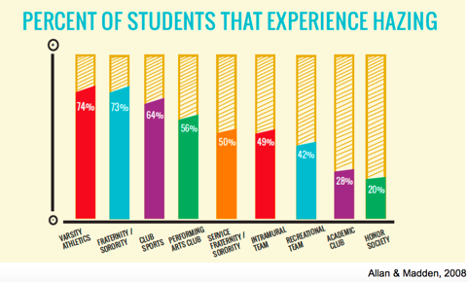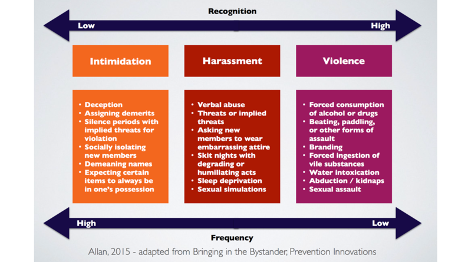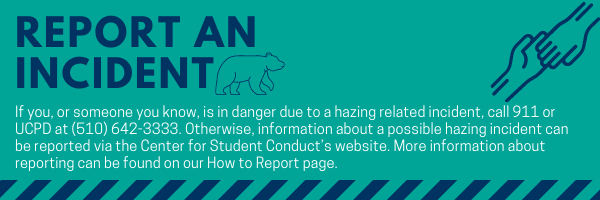Hazing Education, Prevention and Reporting at Berkeley
Acknowledging that hazing occurs and that it can cause harm is an important first step for hazing prevention. We all have a responsibility to make a difference by being informed about hazing and committing to hazing prevention. UC Berkeley is committed to providing a safe educational environment for everyone and does not tolerate hazing by any group or individual affiliated with the University. Berkeley students should expect all student organizations to treat them with respect and dignity. Hazing has no place in the Golden Bear experience or student organization culture. We support student health and well-being. We facilitate belonging, community, and leadership development. Above all, we foster compassion and care.
What is Hazing?
“Hazing is any activity expected of someone joining or participating in a group that humiliates, degrades, abuses, or endangers them regardless of a person’s willingness to participate” (Allan & Madden, 2008).
| Organization Type | Percent of Students that Experience Hazing |
|---|---|
| Varsity Athletics | 74% |
| Fraternity / Sorority | 73% |
| Club Sports | 64% |
| Performing Arts Club | 56% |
| Service Fraternity / Sorority | 50% |
| Intramural Team | 49% |
| Recreational Team | 42% |
| Academic Club | 28% |
| Honor Society | 20% |

When does an activity cross the line into hazing? The following three components are key to understanding hazing:
- Group context: Associated with the process for joining and maintaining membership in a group.
- Abusive behavior: Activities that are potentially humiliating and degrading, with potential to cause physical, psychological and/or emotional harm.
- Regardless of an individual’s willingness to participate: The “choice” to participate may be offset by the peer pressure and coercive/power dynamics that often exist in the context of gaining membership in a group.
Is This Hazing?
| Characteristic of Hazing | Description | Recognition | Frequency |
|---|---|---|---|
| Intimidation |
|
Low | High |
| Harassment |
|
Medium | Medium |
| Violence |
|
High | Low |

If you’re not sure whether or not something happening to you or to someone else is hazing, ask yourself these questions:
- Would I feel comfortable participating in this activity if my parents were watching?
- Would we get in trouble if a school/college administrator walked by and saw us?
- Am I being asked to keep these activities a secret?
- Am I doing anything illegal?
- Does participation in this activity violate my values or those of this organization?
- Is this causing emotional or physical distress or stress to myself or to others?
- Am I going to be able to get a job if I have to put a criminal arrest on my application?
Report an Incident
If you, or someone you know, is in danger due to a hazing related incident, call 911 or UCPD at (510) 642-3333. Otherwise, information about a possible hazing incident can be reported via the Center for Student Conduct’s website. More information about reporting can be found on our How to Report page.
